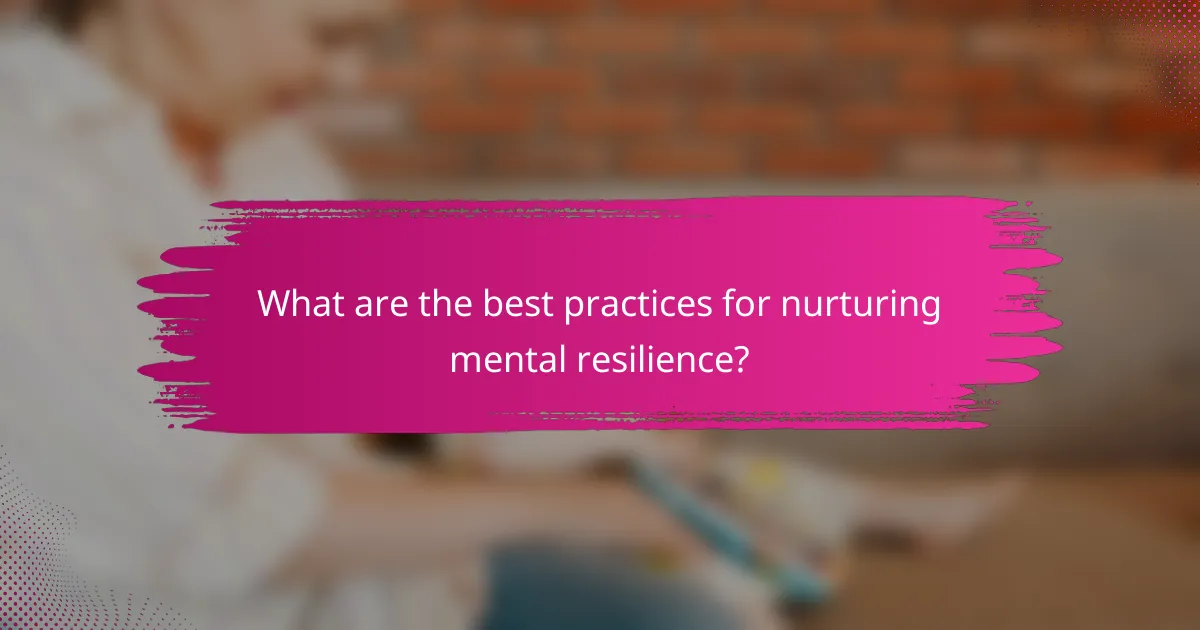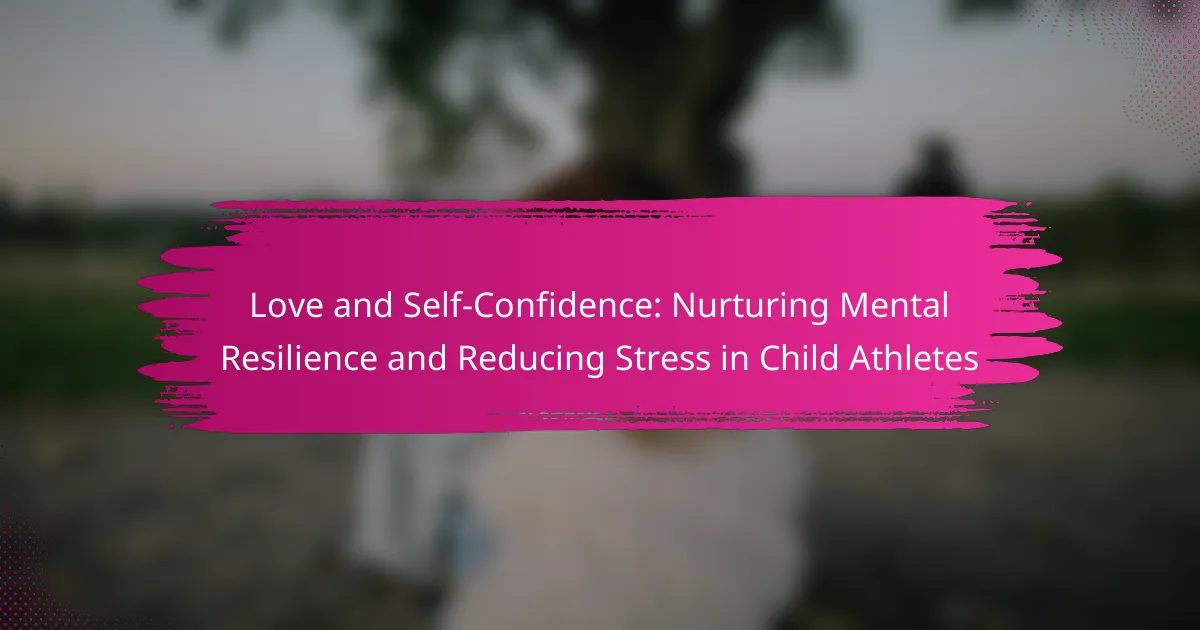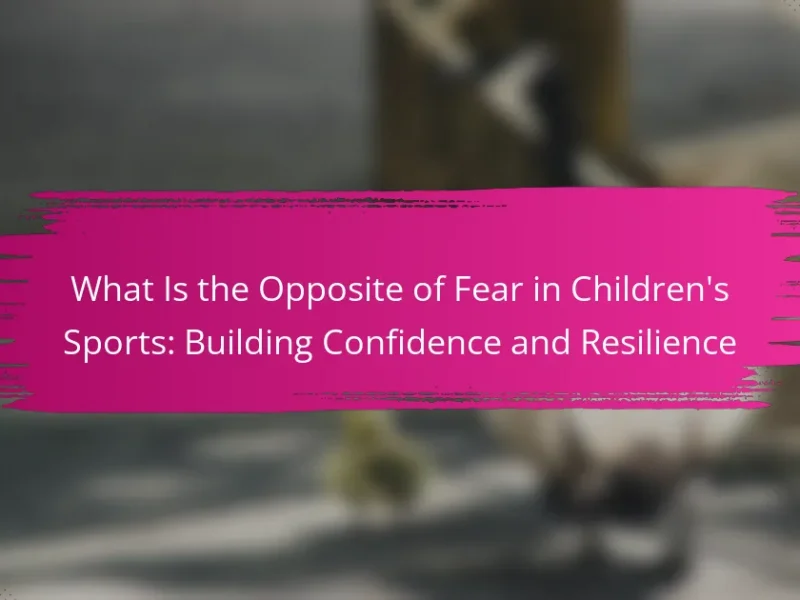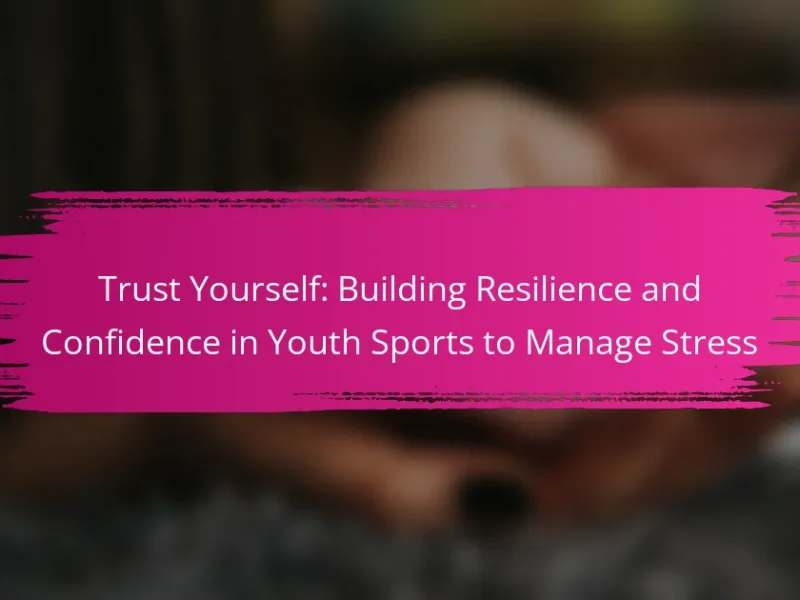Nurturing mental resilience in child athletes is crucial for reducing stress and enhancing performance. Love provides emotional support, while self-confidence fosters a positive mindset. Together, these elements help children manage challenges and thrive in competitive environments. This article explores the importance of strong relationships, positive reinforcement, and coping strategies for developing resilience in young athletes.

How does love influence self-confidence in child athletes?
Love significantly boosts self-confidence in child athletes by providing emotional support and encouragement. This nurturing environment fosters mental resilience, enabling athletes to manage stress effectively. Studies show that children who feel loved are more likely to take risks in sports, enhancing their performance. As a result, strong familial and social bonds are crucial for developing self-esteem and motivation in young athletes.
What are the psychological benefits of love in sports?
Love in sports enhances self-confidence, nurtures mental resilience, and reduces stress in child athletes. This emotional support fosters a positive environment, encouraging athletes to perform better. Studies show that children who feel loved and supported are more likely to develop a growth mindset, which boosts their resilience during challenges. Additionally, love promotes social connections, leading to improved teamwork and communication skills. These psychological benefits create a foundation for lifelong engagement in sports and physical activity.
How can parents and coaches foster a loving environment?
Parents and coaches can foster a loving environment by prioritising emotional support and open communication. Encouraging positive reinforcement builds self-confidence in child athletes. Establishing trust allows children to express feelings, which nurtures mental resilience. Engaging in team-building activities strengthens bonds, promoting a sense of belonging.
What specific actions demonstrate love and support?
Demonstrating love and support involves specific actions that nurture self-confidence in child athletes. Encouragement, active listening, and attending events show commitment. Providing constructive feedback enhances resilience. Celebrating achievements, regardless of size, fosters a positive mindset. Engaging in their interests builds trust and connection.
How does positive reinforcement contribute to mental resilience?
Positive reinforcement significantly enhances mental resilience in child athletes by fostering self-confidence and reducing stress. This approach encourages positive behaviours through rewards, leading to a greater sense of achievement. As a result, athletes develop coping strategies that help them navigate challenges. Studies show that consistent positive feedback can improve performance and emotional well-being, reinforcing a growth mindset. By nurturing a supportive environment, coaches and parents can cultivate mental resilience, ultimately benefiting the athlete’s overall development.

What role does self-confidence play in reducing stress?
Self-confidence significantly reduces stress by enhancing resilience in child athletes. Confident children are more likely to face challenges positively, which lowers anxiety levels. Studies show that self-confidence correlates with improved performance and emotional regulation, creating a positive feedback loop. This dynamic fosters a supportive environment where children feel secure and motivated, ultimately promoting mental well-being.
How does self-confidence affect performance and stress levels?
Self-confidence significantly enhances performance and reduces stress levels in child athletes. High self-confidence leads to improved focus, resilience, and motivation during competitions. As a result, these athletes experience lower anxiety and stress, allowing them to perform at their best. Studies indicate that self-assured athletes are more likely to embrace challenges, resulting in better outcomes in both training and competitions.
What strategies can enhance self-confidence in young athletes?
To enhance self-confidence in young athletes, focus on fostering a supportive environment, setting achievable goals, and promoting positive self-talk. Encouragement from coaches and parents significantly boosts their belief in abilities. Setting small, realistic goals allows athletes to experience success, reinforcing their confidence. Positive self-talk helps combat negative thoughts, building mental resilience. Regular feedback and celebrating achievements further contribute to their self-esteem.
What are the best practices for building self-esteem?
Building self-esteem in child athletes involves fostering a supportive environment and encouraging positive self-talk. Key practices include setting achievable goals, celebrating successes, and promoting a growth mindset.
1. Encourage goal-setting: Help athletes set realistic and measurable objectives to boost confidence.
2. Provide constructive feedback: Focus on effort and improvement rather than just outcomes.
3. Foster a supportive community: Create a team culture that values encouragement and collaboration.
4. Promote self-reflection: Teach athletes to recognise their strengths and areas for growth.
5. Encourage positive self-talk: Help them develop affirmations to combat negative thoughts.
How can visualization techniques improve confidence?
Visualization techniques can significantly enhance confidence in child athletes by fostering a positive mental environment. These techniques help athletes mentally rehearse successful performances, which can reduce anxiety and build self-belief. For instance, studies show that visualising success can increase motivation and focus, leading to improved performance outcomes. Engaging in visualization regularly cultivates a mindset that embraces challenges, ultimately nurturing mental resilience.

What are the universal attributes of mental resilience in sports?
Love and self-confidence are universal attributes of mental resilience in sports. They enhance emotional strength, enabling child athletes to cope with stress and setbacks effectively. A strong sense of love for the sport fosters motivation, while self-confidence boosts performance and reduces anxiety. Studies show that athletes with high self-esteem are more likely to persist through challenges, demonstrating the importance of nurturing these attributes in young athletes. This dual focus on emotional support and self-belief cultivates a resilient mindset essential for success in competitive environments.
How does emotional intelligence contribute to resilience?
Emotional intelligence enhances resilience by fostering self-awareness and social skills in child athletes. It allows them to manage stress and adapt to challenges effectively. High emotional intelligence helps them maintain self-confidence, crucial for performance under pressure. Studies show that emotionally intelligent children exhibit better coping strategies, leading to reduced anxiety and improved focus during competitions. This unique attribute of emotional intelligence directly correlates with enhanced mental resilience, empowering child athletes to thrive in demanding situations.
What coping mechanisms are effective for young athletes?
Effective coping mechanisms for young athletes include emotional support, mindfulness practices, and goal setting. Emotional support from coaches and family fosters self-confidence, reducing stress. Mindfulness techniques, such as deep breathing and visualization, enhance focus and resilience. Setting achievable goals helps athletes maintain motivation and a positive mindset, promoting overall mental well-being.

What unique challenges do child athletes face regarding stress?
Child athletes face unique challenges regarding stress, including performance pressure and identity issues. These athletes often grapple with high expectations from coaches and parents, leading to anxiety. Additionally, they may struggle to balance sports with academics and social life, creating emotional strain. Mental resilience is crucial for managing these stressors effectively. Nurturing self-confidence through supportive environments helps mitigate stress and enhances performance.
How does competition impact mental health in children?
Competition can negatively impact mental health in children by increasing stress and anxiety levels. High-pressure environments may lead to feelings of inadequacy and diminished self-worth. A study found that 40% of child athletes experience significant stress related to competition, which can hinder their overall well-being. Nurturing love and self-confidence in these young athletes fosters resilience and reduces stress, promoting healthier mental states. Encouraging a balanced perspective on competition helps children develop a positive self-image, enhancing their mental health.
What are the signs of stress in child athletes?
Child athletes may show signs of stress through changes in behaviour, emotions, or physical health. Common indicators include increased anxiety, irritability, withdrawal from activities, and changes in sleep patterns.
Physical symptoms can manifest as headaches, stomachaches, or fatigue. Additionally, a decline in performance or a lack of enthusiasm for sports may signal underlying stress. Parents and coaches should monitor these signs to provide support and enhance mental resilience.
How can coaches identify stress-related issues?
Coaches can identify stress-related issues by observing changes in behaviour, performance, and communication. Regular check-ins and open dialogues promote a supportive environment. Signs such as decreased motivation, increased anxiety, or withdrawal indicate potential stress. Monitoring these factors helps coaches nurture self-confidence and mental resilience in child athletes.
What are the long-term effects of unmanaged stress?
Unmanaged stress can lead to long-term mental and physical health issues. Chronic stress affects child athletes by diminishing self-confidence and impairing mental resilience. It can result in anxiety, depression, and decreased performance. Research indicates that prolonged exposure to stress hormones can disrupt cognitive functions and emotional regulation. This underscores the importance of nurturing mental resilience through supportive environments and effective stress management strategies.

What rare attributes influence mental development in sports?
Love and self-confidence significantly influence mental development in sports by fostering resilience and reducing stress in child athletes. Rare attributes such as parental support, positive reinforcement, and emotional intelligence play crucial roles. Parental support provides a stable foundation, while positive reinforcement boosts self-esteem. Emotional intelligence enhances the ability to manage stress and navigate competitive environments effectively. Together, these attributes contribute to a healthier mental state and improved athletic performance.
How do cultural factors shape perceptions of love and confidence?
Cultural factors significantly influence perceptions of love and confidence, shaping emotional resilience in child athletes. Different cultures define love variably, impacting how children experience support and validation. For instance, collectivist societies emphasise communal love, which fosters group confidence, while individualistic cultures focus on self-love, enhancing personal confidence. These contrasting views affect mental resilience, as children internalise cultural values, impacting their stress levels in competitive environments. Understanding these cultural dynamics is crucial for nurturing emotional well-being in young athletes.
What uncommon practices promote mental resilience?
Practices that enhance mental resilience in child athletes include fostering love and self-confidence through positive reinforcement and emotional support. Encouraging open communication promotes a strong sense of belonging, reducing stress. Unique attributes such as mindfulness exercises and visualization techniques can also build mental toughness. These uncommon practices create a supportive environment that nurtures resilience and self-esteem.

What are the best practices for nurturing mental resilience?
To nurture mental resilience in child athletes, foster love and self-confidence through supportive environments. Encourage open communication to build trust, allowing children to express feelings and concerns. Promote positive self-talk and affirmations to enhance self-esteem. Incorporate team-building activities that strengthen relationships and provide a sense of belonging. Teach coping strategies for stress management, such as mindfulness and relaxation techniques. Regularly celebrate achievements, reinforcing a growth mindset and resilience in facing challenges.
How can parents support their child’s mental development in sports?
Parents can support their child’s mental development in sports by fostering love and self-confidence. Encouragement builds resilience, helping children cope with stress. Create a positive environment by celebrating efforts and achievements, regardless of outcomes. Engage in open communication to understand their feelings and challenges. Additionally, modelling healthy coping strategies can enhance their emotional well-being.
What common mistakes should be avoided to reduce stress?
To reduce stress, avoid common mistakes such as neglecting self-care, setting unrealistic expectations, and ignoring emotional needs. Prioritise balance, establish clear communication, and foster a supportive environment for child athletes. Recognising these pitfalls enhances mental resilience and nurtures self-confidence.
How can coaches implement effective mental health strategies?
Coaches can implement effective mental health strategies by fostering love and self-confidence in child athletes. This can be achieved through open communication, positive reinforcement, and creating a supportive environment.
Encourage athletes to express their feelings and concerns without fear of judgement. This builds trust and enhances emotional resilience. Positive reinforcement helps in developing self-esteem, making athletes feel valued and confident.
Additionally, integrating stress-reduction techniques such as mindfulness and relaxation exercises can significantly benefit mental well-being. These practices teach athletes to manage stress effectively, enhancing their overall performance and enjoyment of the sport.
Regular check-ins and mental health workshops can also provide valuable resources, ensuring athletes have access to support when needed.
What resources are available for training coaches in mental resilience?
Coaches can access various resources for training in mental resilience, focusing on child athletes. Workshops and seminars provide practical skills and strategies. Online courses offer flexibility and a range of topics. Books and research articles deliver in-depth knowledge and evidence-based practices. Peer support networks encourage sharing experiences and best practices. Additionally, mentorship programs connect novice coaches with experienced professionals for guidance.
What role does community support play in athlete development?
Community support is vital in athlete development as it enhances love and self-confidence. Supportive environments foster mental resilience and reduce stress in child athletes. Positive reinforcement from peers, coaches, and family cultivates a sense of belonging, which is crucial for emotional growth. Research shows that children with strong community backing exhibit higher self-esteem and better performance, as they feel valued and understood. Additionally, community engagement provides opportunities for social interaction, helping young athletes develop essential life skills.


